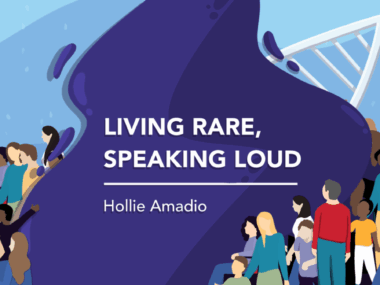Finding a doctor who believed us was a long and frustrating journey
Years of fighting for a diagnosis turned my daughter into an advocate
Written by |

My adopted daughter, Leah, was diagnosed with hereditary angioedema in 2019. My son Dorian and I were subsequently diagnosed with the same condition, and my firstborn daughter, Aria, has acute allergic angioedema. Leah has other rare diagnoses, including an ultrarare genetic disease, so it’s safe to say our family has a great deal of experience with medical specialists.
There seems to be a recurring theme in Bionews columns of being your own best advocate. Those of us living with rare diseases have vastly different experiences from the generally healthy population. I believe we know ourselves better than many medical professionals give us credit for.
In my family’s experience, however, finding a doctor who will listen to us — much less take our symptoms seriously — has been an extraordinary challenge.
Because the most severe manifestations of Leah’s illness began around the onset of puberty, her symptoms were brushed off. Some providers thought she simply didn’t understand or couldn’t cope with the changes happening in her body. Others believed it was “all in her head.”
We were directed to many therapists: physical, mental health, somatic, and more. We saw at least 40 specialists, including women’s health providers, neurologists, geneticists, gastroenterologists, cardiologists, pulmonologists, endocrinologists, rheumatologists, and hematologists. Sometimes we saw multiple physicians from the same specialty because one referred us to someone else in the field. Several didn’t want to take her case because it seemed too complicated and time-consuming.
The worst was not being taken seriously, or a physician not believing that a young person could have multisystemic symptoms. Because of my tenacious nature and refusal to back down without answers, some people even suggested that I had Munchausen syndrome by proxy.
Not being heard makes it challenging to get a diagnosis, but it also poses issues for disease research. Patient participation is necessary, so treating us with kindness and respect benefits everyone involved.
It’s often said in the rare disease community, “Nothing about us without us!” It’s absolutely true. We should not only be accepted as partners in our medical journey, but also seen, heard, and respected as the most experienced and invaluable participants.
It took many years and far too many trips to doctors, both in and out of state, to find a provider who could help Leah. Sometimes we’d travel for days or weeks for her to endure tests, treatments, hospitalizations, and invasive diagnostic procedures. Fortunately, a curious and persistent research immunologist continues to treat her and navigate this journey with us.
Leah has suffered more than most young people her age, but thanks to her endurance, she has matured into a fierce advocate — not just for herself, but for others living with rare diseases.
Many thanks to everyone at Bionews for all the support and for giving us a place to share our story. Remember, you are not alone. My family and I stand with you on your rare disease journey.
Note: Angioedema News is strictly a news and information website about the disease. It does not provide medical advice, diagnosis, or treatment. This content is not intended to be a substitute for professional medical advice, diagnosis, or treatment. Always seek the advice of your physician or other qualified health provider with any questions you may have regarding a medical condition. Never disregard professional medical advice or delay in seeking it because of something you have read on this website. The opinions expressed in this column are not those of Angioedema News or its parent company, Bionews, and are intended to spark discussion about issues pertaining to angioedema.


Leave a comment
Fill in the required fields to post. Your email address will not be published.